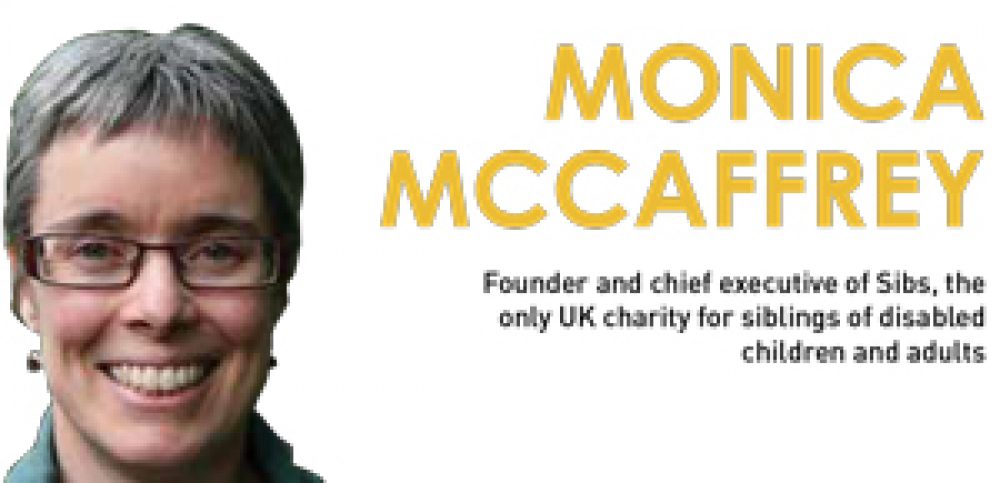As many as two pupils in every classroom have a sibling with special educational needs or disability and are at risk of becoming young carers. They’re more likely to have problems with progress in school – so it’s vital that you know who they are
I was a sibling young carer who grew up in a family that struggled to manage my disabled brother’s behaviour. School evenings involved a combination of looking after him, helping him get to sleep, defusing volatile and aggressive situations, and trying to cover up the damage he did to my homework. Staff at school were never aware of my home situation or, if they were, failed to respond in a supportive way. Equally, it never occurred to me that things could be any different. It had a significant impact on my wellbeing – and my exam results.
Why should you care about sibling young carers? First, many families of disabled children would struggle to cope without their support. More than 50 per cent of the hidden young carers in England are sibling young carers. They look after brothers and sisters who are disabled or who have special educational needs, serious illnesses or medical conditions, or mental illness. For example, Katy, who is nine, gets the pump ready for her brother’s tube feed before she gets her own breakfast – I don’t know many adults who would want that responsibility. Siblings often also care for their parents practically and emotionally when the impact of care takes it toll.
Second, there is an educational penalty; young carers are more likely than the national average to be not in education, employment or training (Neet) between the ages of 16 and 19.
But caring is not the only factor with an educational impact. Our research evidence review highlighted two groups of siblings who may be most at risk for problems with attainment and wellbeing – sibling young carers and siblings whose brothers and sisters have high levels of behavioural problems. If you can’t sleep because your brother with an autistic spectrum disorder (ASD) is screaming, every night, you shouldn’t be expected to concentrate in class.
Third, this is a large vulnerable group within the school population. One academy I visited recently had identified 60 siblings with disabled siblings out of its 900 pupils; the equivalent of two in every classroom. If you knew that even some of these pupils were likely to have problems with progress, wouldn’t you want to know who they were?
I want all schools to have a formal identification system for siblings of children with SEND, with this specific question on intake forms for parents/carers: “Does this pupil have a brother or sister who is disabled or who has special educational needs or a serious long-term illness or condition?” Once you know who they are, you can compare their attainment data with that of their peers.
All schools should have a formal identification system for siblings of children with SEND
What next? Educate your staff about the barriers to learning for siblings and include this group in your policies on anti-bullying, young carers, safeguarding and SEND. I’m shocked that siblings are still being taken out of lessons to help support a brother or sister with communication or behaviour problems. Some schools run sibling groups and provide one-to-one support interventions. As well as helping with the difficulties, good support helps to affirm the many positives of the sibling relationship and family life for siblings. Sibs can help you to develop this support.
Any sibling of a child or young person with SEND can become a young carer during their time at school. Changes in the disabled child’s condition, in the family make-up, or in the external support available can all tip a sibling into a caring role – an A-level pupil becomes a young carer when her older sister’s paid carer goes on long-term sick leave or a 13-year-old sibling now sleeps in the same room as his brother, who has started having seizures, so that he can alert his mum at night.
Inappropriate care by siblings is what happens when the statutory support for the families of disabled children and young people is not available. Reduced local authority budgets will make this an increasing problem; the knock-on effect will be on the progress and wellbeing of siblings in your school. Take that first step of finding out who they are.
Monica McCaffrey is the Founder and Chief Executive of Sibs, the only UK charity for siblings of disabled children and adults







The author Francis Spufford wrote movingly in his book ‘The Child That Books Built’ (2002) about having a sister with a rare genetic illness and the impact that had on him and his family. I’d never given any thought to youngsters being in that situation before reading that book and I guess many others are similarly ignorant. That is why articles like this matter.
I’m impressed with the research you have done and your passion for this often hidden, often self-sacrificing group of children. So much more is needed. Kudos to you in the UK for paying attention to these issues. Well done, Ms McCaffrey.
Harriet Redman
Executive Director
WisconSibs, Inc
Appleton, Wisconsin USA